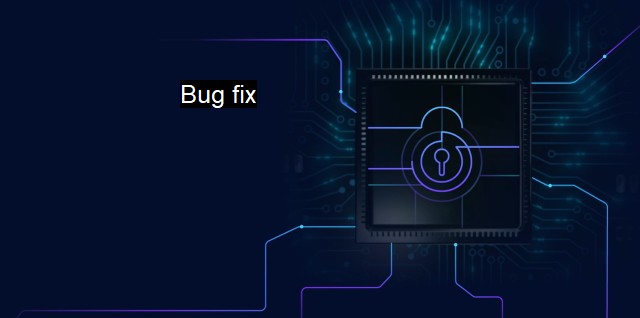What is Bug fix?
The Criticality of Bug Fixes in the Cybersecurity Realm: Understanding Vulnerabilities, Patches, and Their Importance.
Within the realm of cybersecurity and antivirus software, the term "bug fix" holds extraordinary weight. As an integral component of software development and maintenance, bug fixing is the process of identifying and resolving issues, errors, or flaws in computer programs that impede the intended functionality of the software.Typically, the bugs in software programming could manifest in a plethora of ways - from simple visual errors to considerable security risks, such as vulnerabilities that can be exploited by malicious entities, which can lead to unauthorized access to sensitive information or function execution. Bug fixes are thus crucial in cybersecurity to prevent the exploitation of such programming flaws and avert potential digital attacks.
Programmers and developers regularly perform code reviews and apply advanced debugging tools to spot and rectify these programming anomalies to make the software function with higher reliability and security. These identified errors are then resolved in a 'bug fix.' This term collectively describes updates or patches issued for software to mitigate the identified bugs.
Bug fixes primarily serve to approach and address two primary issues in software. The first is to rectify operational issues - instances that prevent the software from performing its task seamlessly. The crash of a program, slow operations, or incompatibility with other software can be flag bearers of such bugs.
Bugs can also reveal potential cybersecurity breaches. In the ever-evolving digital realm, software often faces the threat of infiltration by malicious strains, including viruses, Trojan horses, worms, ransomware, spyware, and adware. A seemingly small bug can award these injurious entities an entry into the software, disrupting not just the functionality but also compromising on security and privacy.
Therefore, bug fixes are strongly interwoven with antivirus operations. Consider antivirus software, applications dedicated to detecting and neutralizing any potential threats that imperil the health of a computer system. These applications themselves are prone to bugs that might weaken the system's protective shield. A bug, for instance, could render an antivirus program incapable of updating itself to recognize new threats, or it might cripple its ability to quarantine threats, thus leaving the computer system wide open to cyberattacks.
In these cases, prompt bug fixes help rectify these inherent issues, thereby strengthening the antivirus software's capability and reinforcing the computer system's security fortification. Regular and timely updates to antivirus software that comprise bug fixes are hence a vitalpart of maintaining a robust cybersecurity framework.
Bug fixes power continual software improvement by deploying adaptive measures to avoid further development of similar issues. Integration of artificial intelligence in automating bug fixes is an advanced approach that allows developers to learn from past errors and proactively fix potential bugs efficiently and effectively.
Bug fixes play an integral role in cybersecurity and antivirus software. They represent the incessant efforts made by developers and cybersecurity engineers to keep software running smoothly while guarding against potential security threats. They ensure software health, maintain execution integrity, and alleviate the susceptibility to cyber threats - forming a pivotal part of a software's lifecycle, essential for the digital security of systems worldwide.

Bug fix FAQs
What is a bug fix in the context of cybersecurity and antivirus?
A bug fix in cybersecurity and antivirus refers to the process of identifying and addressing any issues or defects within software code that may lead to vulnerabilities or system malfunctions. It involves the remediation of software errors, glitches, or other issues that may compromise the security of your computer or network.Why is bug fix important in cybersecurity and antivirus?
Bug fix plays a vital role in cybersecurity and antivirus because it helps to keep your systems secure and protected against potential cyber threats. If left unaddressed, software bugs and vulnerabilities can be exploited by cybercriminals to gain unauthorized access, steal sensitive data, or compromise the integrity of your computer or network. Regular bug fixes ensure that your security software is up-to-date and resilient against new and emerging threats.How do I know if a bug fix is necessary for my antivirus software?
You can determine if a bug fix is necessary for your antivirus software by monitoring your security alerts and updates. Most security software providers issue regular software patches and updates to address any identified vulnerabilities or bugs. You should always install the latest updates to ensure that your antivirus software is optimized for maximum protection. Additionally, if you experience any unusual system behaviors or errors, it may indicate the presence of a software bug that requires attention.Can I perform bug fixes on my antivirus software myself?
While it is possible to perform bug fixes on your antivirus software yourself, it is not recommended. Bug fixing requires specialized knowledge and technical expertise to identify and address software errors without causing further damage or compromising your system security. You should always consult with a cybersecurity professional or your antivirus software provider to ensure that any bugs or vulnerabilities are properly addressed.| | A | | | B | | | C | | | D | | | E | | | F | | | G | | | H | | | I | | | J | | | K | | | L | | | M | |
| | N | | | O | | | P | | | Q | | | R | | | S | | | T | | | U | | | V | | | W | | | X | | | Y | | | Z | |
| | 1 | | | 2 | | | 3 | | | 4 | | | 7 | | | 8 | | |||||||